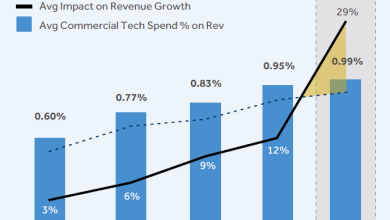Corporate Finance Poised to Shift to Increased Automation in Coming Years
From smart thermostats to self-driving cars, artificial intelligence is all around us. Most of the time we don’t even acknowledge or recognize its pervasiveness. We don’t think about the algorithms that drive which ads we’re being served online or why Netflix is recommending certain movies. It’s just integrated into the stream of data we ingest every day.
We are indifferent passengers on a path being carved by intelligent machines, and few of us stop to think of how we may use these tools to improve our own lives. But the same algorithms that help Facebook serve up the most relevant posts in your news feed can help streamline your business.
“We’re standing now on the cusp of a true sea change in the way business is conducted across the board,” said Glenn Hopper, finance and artificial intelligence expert and author of Deep Finance: Corporate Finance in the Information Age.
“You have these massive, data-centric companies like Google, Amazon and Facebook (Meta) that are leading the charge in use of big data in every aspect of operations, but the change is rippling through businesses of all sizes and from all industries,” Hopper said.
Just as robotics revolutionized manufacturing in previous decades, AI and ML are changing the digital pipeline today.
“Business leaders are starting to realize the value of data,” Hopper said. “And they’re seeing that it’s data that fuels artificial intelligence: data about your customers, about your industry, about your processes and procedures, and about the economy in general. The more data you can collect as a business, the more you can find correlations between data points, and the more you can capitalize on it to make better business decisions.”
Jason Krantz, founder and CEO of analytics advisory and consulting firm Strategy Titan, agrees. He preaches the importance of data literacy for business leaders. “Data literacy means you know what data you’re tracking, why you’re tracking it, how to interpret it, and how to use that data to develop new capabilities, grow sales, reduce costs and/or do your job better/more efficiently,” Krantz said.
Big Data and artificial intelligence are directly linked and tied to a third component: Automation. By linking systems and sharing data across them the move is to an ever-increasing number of touchless and human-free transactions as automation reaches deeper into back-office operations of business. With operations automated, businesses can increase focus on business intelligence and improving business insights. Self-service will become the norm, and new service delivery models will emerge as robots and algorithms work alongside humans to provide products and services.
“I call it moving from hunch to hypothesis,” Hopper said. “Those of us who’ve been in the business world for a long time frequently have ideas based on our own experiences and beliefs. But with the right data and the right tools we can actually quantify those hunches. We can put data behind them to make better, more informed decisions.”
Through ongoing collection of data and connected reporting, businesses can start moving toward greater possibilities of automation, which frees up headcount for more strategic work – work that adds greater value to the company. Human capital in this instance is not entering data, but rather collecting and analyzing it and using it to drive decisions.
In his book Deep Finance, Hopper argues that corporate finance departments should lead the charge for digital transformations.
“With the continued evolution of financial and accounting software, the nature of finance has shifted from transactional and historical to real-time and analytical. CFOs are still responsible for traditional finance activities like FP&A, audit, compliance, and treasury management, but in the era of Big Data, effective CFOs additionally must become masters of business intelligence,” Hopper said.
Hopper added, “Finance departments have a distinct view into all aspects of the company, which puts the well-informed CFO in a unique position to combine business operations knowledge with financial insights. Further, the adoption of data analytics is a natural fit for the finance department, where analysts are accustomed to finding trends, patterns and meaning in numbers. Just as in financial analysis, business analytics reveals trends, risks and opportunities. With more information, analysts can use data to further refine not only financial models, but also to identify risk and regulatory issues, increase productivity and efficiency, and evaluate new business opportunities.”
Hopper and Krantz both noted that the state of the technology in corporate finance for most companies today is barely brushing the surface of what is possible in the very near term future. When most fin-tech experts discuss AI in finance operations right now they are talking about Robotic Process Automation (RPA), which is a huge timesaver, but not true machine learning. The shift is happening though.
“Just as cloud-based accounting revolutionized corporate accounting by offering previously unimaginable levels of collaboration, accessibility, efficiency, timeliness and security, new technologies like machine learning will lead the next revolution in accounting and finance.
Through machine learning, time spent by humans scouring data for trends and correlations will be offloaded to software that automates complex processes and monitors anomalies in real time. Machine learning programs that use Natural Language Processing (NLP), Bayesian analysis, and other supervised and unsupervised methodologies to classify transactions and to define or refine data models used for forecasting will be the norm — sooner than many might realize,” Hopper said.
“Technology already exists that would allow learning machines to make a first pass of financial analysis to identify and highlight patterns, check for errors, and identify anomalies. Automating this manually intensive process would allow finance professionals to spend less time on data entry and review, freeing them to take a deeper dive into business analytics and make use of real-time information to drive business decisions,” he said.
Just as with any technological change, companies shifting to the AI-driven firms of the future will need forward-thinking leaders who can see the promise of this exciting technology and have the drive and plan to lead their digital transformation.




My book referenced in the article can be found on Amazon and other booksellers.